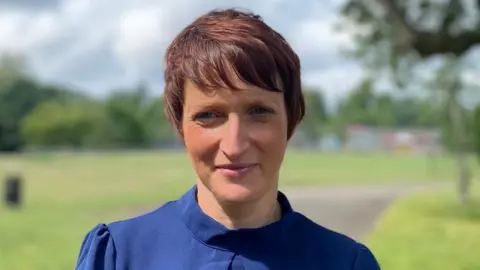Rape survivor: Sexual violence uni staff training might have saved me
 BBC
BBCA sexual violence survivor says if university staff had been specially trained, she might not have been raped.
Campaigners and experts believe universities are not keeping an adequate record of the widespread level of sexual violence.
They said this data was vital to provide adequate support and services.
A three-month BBC investigation has revealed that fewer than half of UK universities could provide up-to-date sexual misconduct data.
Freedom of Information requests (FOI) to all 142 public universities showed that they categorise these reports in different ways. Some use sexual misconduct as an umbrella term, while others had more specific labels like rape, sexual assault and harassment.
In Wales' eight universities, more than 1,000 reports of sexual misconduct were recorded in the past six years.
But many people choose not to report and so are not reflected in this FOI data.
One of the people who is not included in the figures is Ffion, whose name we have changed to protect her identity.
When the 25-year-old began studying at Swansea in 2017 she said she felt isolated and began dating another student who physically and emotionally abused her, and then raped her.
Ffion said accommodation security witnessed behaviour from her boyfriend which should have led them to act, such as "trashing" her room regularly and "threatening suicide" when she tried to break up with him.

She said: "I think if the security staff were taught about bystander training, I think that would have made a difference - there would have been help at recognising the signs."
Bystander training teaches people to spot unacceptable behaviour and intervene in a safe way to prevent violence.
"Intervention should have started earlier from when he was physically abusive and I think that would have prevented me staying with him and possibly would have prevented him from having sex with me without my consent," she said.
Ffion told a lecturer about her experience in 2020 when studying for a Masters. He "was very supportive" but did not signpost her to any available resources.
She made a police report, but they were unable to take her case forward. Instead she was referred to specialist support.
Swansea University said it took "all allegations of sexual assault seriously and has robust processes in place".
It added that security personnel were "identified as key staff members" who interacted with students and so "are trained as bystanders and mental first aid trainers to be able to recognise signs of distress and provide appropriate support".
It is implementing the recommendations of a review into its handling of sexual misconduct and is seeking to drive culture change through the delivery of bystander intervention and consent training
Why is there so little data?
BBC Wales sent all 142 public UK universities FOI requests asking how many reports of sexual misconduct they have had from 2013 to 2023. A total of 42 did not respond, 33 refused and 67 were able to provide only partial data.
Several of the universities had deleted information after a certain period of time in line with their data retention policy.
For example, the University of South Wales said it did not hold sexual misconduct data before 2017/18 as it was deleted six years after the last action on the case.
Rhian Bowen Davies, the Welsh government's former national adviser for violence against women, said there should be a "requirement on universities to regularly, consistently collate data".

Ms Bowen Davies said: "Without knowing the extent of the issue, how do we develop services and responses that best meet the needs of survivors and hold the perpetrators of these offences accountable?"
She said she questioned how willing universities were to understand the extent of the issue as the results may affect their business.
Her views were echoed by Prof Rachel Fenton, a law academic at the University of Exeter, who presented her research to the cross-party Equality and Social Justice Committee in the Senedd - Welsh Parliament.
She said: "Universities are acting very autonomously and the experience for female students is qualitatively different depending on where they go."
Prof Fenton said students were particularly vulnerable to sexual violence for a "whole host of reasons", such as being away from home and forming new relationships.
She said we cannot expect students "living away from home for the first time to necessarily know how to navigate the systems that are in place".
Hannah, which is not her real name, is studying at Aberystwyth University and said she was "dismissed" by her academic tutor when she was sexually assaulted twice by another student.
She said the academic did not help her get an extension for coursework, and nor was she referred to the university reporting system.
The 23-year-old decided not to report it to police but did disclose it to the university's reporting system after another student told her about the service.
She said the system was helpful and staff were kind.
"The teachers, and especially the personal tutors that each student is assigned, should have training in how to respond to it - know this is the help that they can give, know they can be a support for the students."
 Getty Images
Getty ImagesShe said this could "make a huge difference."
Aberystwyth University said it had "an accessible reporting system, Report and Support", managed by an anti-harassment and violence team and sexual violence liaison officers.
An independent sexual violence adviser has also been recruited, the university said, and it wanted to ensure "effective, swift and compassionate care".
Universities can delete data
The results of the 142 FOI requests show that three universities publish data online every few years.
Retention policies mean universities can delete data after a certain period of time, which several gave as reasons they could not respond.
Some universities refused because they said low reported numbers could identify individuals.
Others provided partial data, but for years where there were fewer than five reports, they refused to give exact numbers.
Some said they would have to manually go through student files as they did not hold the number of reports in one accessible database, which would exceed the 18-hour time limit for answering FOI requests.
Ms Bowen Davies questioned whether these refusals were a "smokescreen" to avoid providing information which could impact them as businesses.
Emily Carr, 23, who previously shared her experience of sexual violence, is a member of the student-led campaign Time To Act Cardiff.
She said universities should be "mandated" to provide the number of sexual violence reports annually to "a national database which is controlled by an independent body".
 Emily Carr
Emily Carr"Universities have to declare their finances but they don't have to declare when they have potential rapists they are bringing into society.
"Numbers aren't everything, but when you're coming up against these multimillion-pound institutions, unfortunately there is a reliance upon numbers."
Ms Carr said the campaign group had been contacted by students across the UK concerned about their universities.
"Everyone benefits when survivors win," she said.
Jo Grady, University and College Union (UCU) general secretary, said one in 10 staff experienced sexual violence, in addition to students.
"This shows a shocking level of institutional failure," she said. For bystander training to work "it must be properly resourced and part of a wider systemic change," she added.
The Welsh government said it expected students to be able to pursue their studies free from harassment, discrimination or victimisation.
It added that specific incidents were a matter for each university as they were independent of government.
Universities Wales said "while progress has been made" it knows "there is more to do" and said it "will continue" work within the sector to make sure students and staff have the "experience they deserve".

If you or someone you know has been affected by the issues raised in this report, you can find information about the support available at BBC Action Line.
